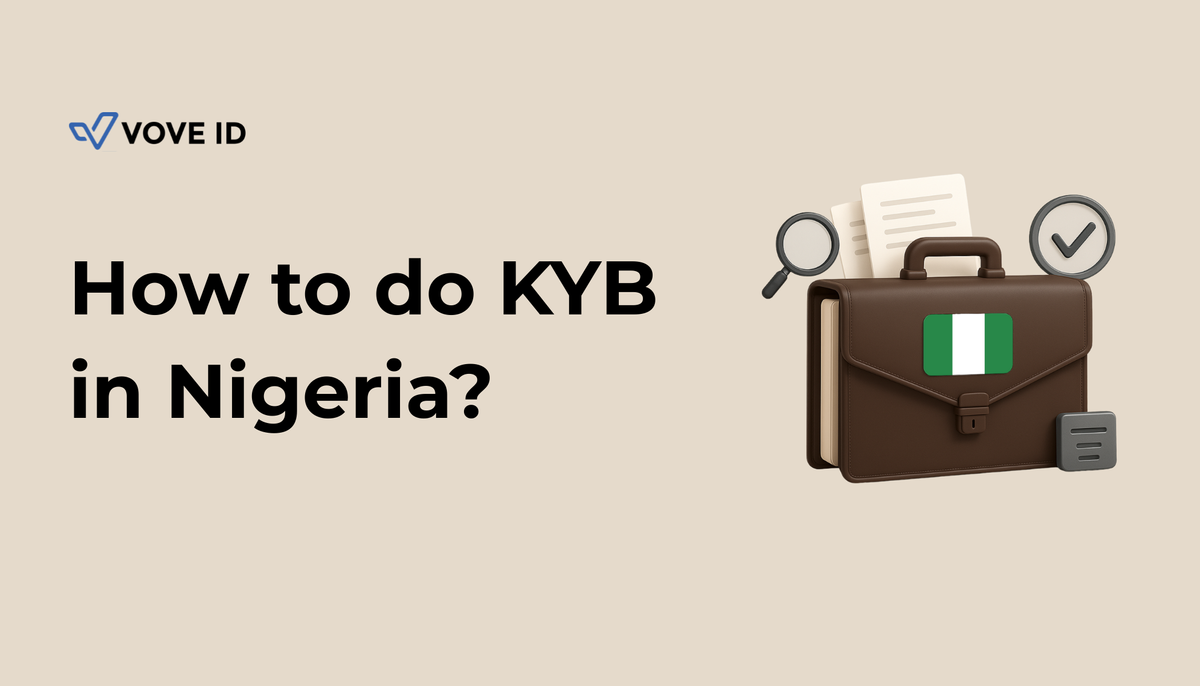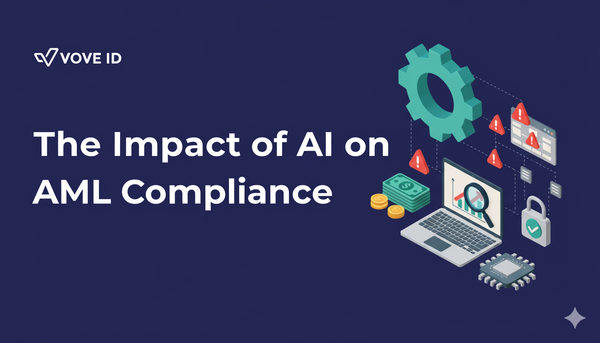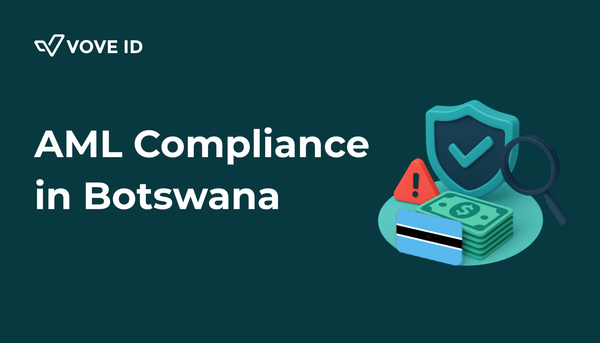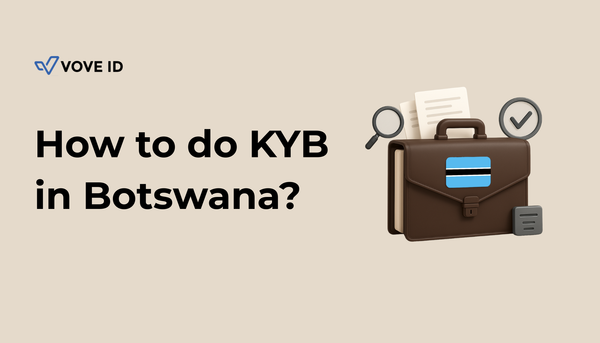How KYB Is Powering Nigeria’s Business Growth
Master KYB Nigeria with VOVE ID’s AI-powered solutions. Ensure AML compliance, verify partners, and thrive in Nigeria’s $477B economy. Book a demo now!

Nigeria’s Business Surge and KYB’s Role
Nigeria, Africa’s largest economy, recorded a GDP of $477 billion in 2023, reflecting its fast-growing potential. It’s a rising hub for startups and enterprises, driven by a booming fintech sector with $1.2 billion in 2023 revenue. This growth invites risks, fraud, money laundering, and regulatory pressure. KYB Nigeria, Know Your Business, supports business verification in Nigeria under Central Bank of Nigeria (CBN) regulations, effective in 2025. AI-driven KYB solutions like VOVE ID streamline compliance in this vibrant market.
What KYB Means for Nigeria
KYB verifies a business’s legitimacy, ownership, and operations, safeguarding Nigeria’s financial system. It’s enforced by the Money Laundering (Prohibition) Act 2022 and the Nigerian Financial Intelligence Unit (NFIU). From Lagos fintechs to Abuja SMEs, KYB fosters trust and meets global standards.
Why KYB Matters
KYB delivers:
- Fraud Prevention: Shell companies mask illicit funds, KYB uncovers them with ownership checks.
- Compliance: Non-compliance can attract fines up to ₦250 million (~$150,000 USD), per the Act.
- Trust: Verified businesses draw investment, Nigeria saw $3.3 billion FDI in 2023.
KYB fuels Nigeria’s economic rise.
KYB in Action: PaySwift’s Challenge
Take PaySwift, a Lagos-based crypto wallet startup registering with the Corporate Affairs Commission (CAC). It submits its incorporation certificate and verifies directors via Bank Verification Numbers (BVN). Onboarding unregistered rural vendors, often without digital records, poses a hurdle. Transactions over ₦5 million (~$3,000 USD) trigger NFIU reporting. Automated KYB with AI ensures compliance across Nigeria’s urban-rural divide.
Key KYB Requirements
For KYB Nigeria, businesses must provide:
- Registration: CAC certificate of incorporation or business name.
- Ownership: Directors and shareholders with BVN or NIN.
- Address: Utility bill or lease agreement.
- Risk Checks: Screen against CBN sanctions and FATF lists.
- Monitoring: Track high-value transactions for anomalies.
How KYB Works
A robust KYB process includes:
- Data Collection: CAC docs, Tax Identification Number (TIN), ownership details.
- Verification: AI cross-checks CAC and CBN databases, high accuracy is possible, up to 95% with quality data.
- Risk Assessment: Flag money laundering risks.
- Ongoing Review: Update records as businesses evolve.
Tech Powering KYB
AI enhances business verification processes in Nigeria:
- Speed: Real-time CAC lookups cut delays.
- Accuracy: Biometrics and OCR verify IDs.
- Scale: Digital profiles sync with NFIU systems.
An increasing number of Nigerian firms adopt tech-driven onboarding, up from around 45% in 2023, per industry trends.
Nigeria’s KYB Framework
CBN’s 2023 CDD Regulations and NFIU guidelines drive KYB:
- CAC Registration: Required for all entities.
- AML Rules: Enhanced due diligence for risky firms.
- Tiered Approach: Basic checks for SMEs, full audits for corporates.
As a member of the Inter-Governmental Action Group against Money Laundering in West Africa (GIABA), Nigeria aligns KYB with FATF recommendations. CBN’s 2024 guidance noted, “Digital risks demand stronger KYB.”
KYB Challenges
Nigeria’s KYB landscape presents significant obstacles businesses must navigate:
- Data Gaps: Many rural firms lack digital records, complicating verification. With over 60% of Nigeria’s population in rural areas and limited CAC digitization outside urban centers, businesses often rely on paper-based registries or incomplete filings. This slows onboarding and raises compliance risks for firms expanding beyond Lagos or Abuja.
- Fraud: Synthetic entities, fake businesses built with stolen or fabricated data, exploit these gaps. These shell companies, often used for money laundering, thrive in Nigeria’s fast-paced economy, where manual checks can’t keep up. AI-powered KYB counters this by analyzing patterns and flagging inconsistencies, but the threat persists as fraudsters adapt.
- Privacy: The Nigeria Data Protection Act 2023 mandates explicit consent for collecting and processing business data, adding a layer of complexity. Firms must balance robust KYB with customer trust, ensuring secure storage and transparency, especially for SMEs unfamiliar with compliance burdens.
Benefits of Strong KYB
Effective KYB Nigeria delivers tangible advantages for businesses and the economy:
- Credibility: Verified firms shine in Lagos markets, standing out to investors and partners. A CAC-registered business with vetted ownership signals reliability, crucial in a competitive hub where trust drives deals, Nigeria’s $3.3 billion FDI in 2023 underscores this demand.
- Growth: KYB boosts fintech and SME expansion by simplifying compliance and unlocking opportunities. Verified startups can onboard vendors faster, access credit, and scale operations, key in a sector that generated $1.2 billion in 2023 revenue and continues to grow.
- Security: It shields against financial crime, protecting Nigeria’s financial system. By blocking shell companies and illicit flows, often tied to transactions over ₦5 million (~$3,000 USD), KYB reduces exposure to NFIU scrutiny and multi million Naira fines, fostering a safer business environment.
Take Action
Navigating Nigeria’s KYB landscape can be complex, but compliance doesn’t have to be a burden. VOVE ID provides businesses with seamless, automated KYB solutions designed to ensure compliance without compromising efficiency. Explore our solutions today and future-proof your compliance strategy.




